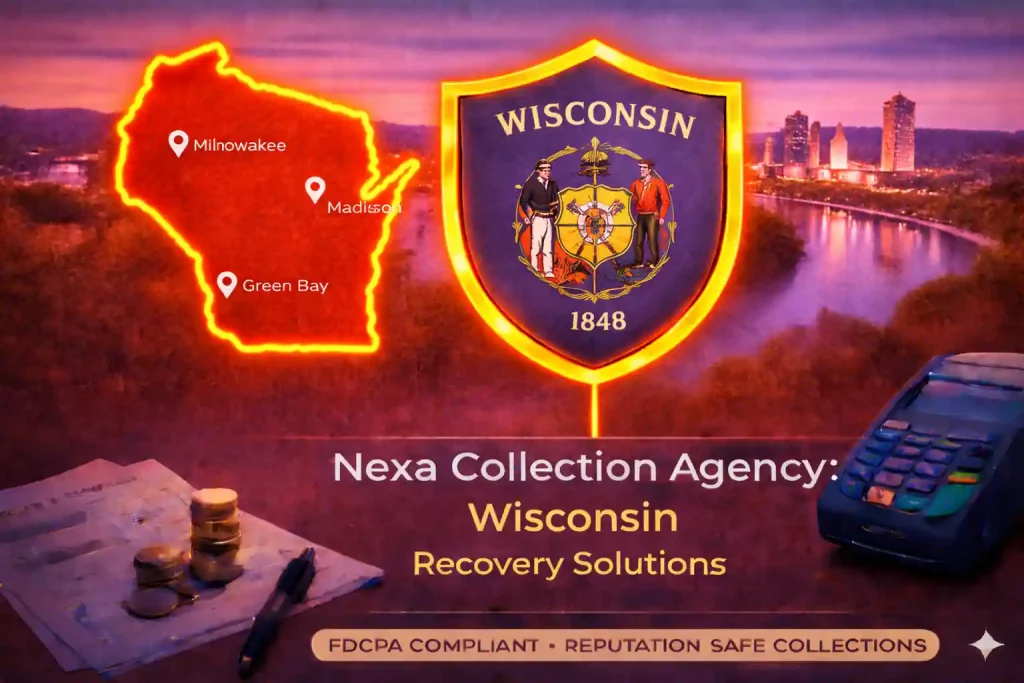Look, most collection agencies treat Wyoming like just another “flyover” state. They’re wrong. In 2026, Wyoming isn’t just a scenic frontier; it’s a privacy fortress and a creditor’s goldmine. While other states are slashing recovery windows, Wyoming still honors a massive 10-year statute of limitations on written contracts. If you’re a business owner or medical provider in the Cowboy State, your aging ledgers aren’t just paper—they are untapped capital. But you can’t just “dial for dollars” anymore. Between the 2026 federal shifts in medical reporting and Wyoming’s strict privacy expectations, you need a partner who knows how to navigate the high-plains legal landscape without stepping on a regulatory landmine.
Nexa provides 100% reputation-safe, equipped with all 50-state collections license, offering free credit reporting, free litigation/bankruptcy scrubs, and zero onboarding fees. Secure – SOC 2 Type II & HIPAA compliant.
Need a Collection Agency? Contact us
Wyoming Debt Recovery: Turning “Uncollectible” into Capital
Whether you’re in the energy corridors of Gillette, the tech-privacy hubs of Jackson, or the medical centers of Cheyenne and Casper, Nexa is your strategic recovery partner. We don’t do “robocalls.” We do Asset-Scrubbing, High-Impact Mediation, and Judicial Recovery.
The “Cowboy State” Advantage
Wyoming gives you more time than almost any other state to get paid. But in 2026, the way you use that time determines your success.
-
The 10-Year Written Contract Window: Under Wyo. Stat. § 1-3-105(a)(i), you have a decade to recover on written agreements. Nexa specializes in “Zombie Ledger Recovery,” reviving high-value 2017–2021 accounts that national agencies have already given up on.
-
The 8-Year Oral/Account Rule: Even without a formal contract, Wyo. Stat. § 1-3-105(a)(ii) gives you 8 years. Your “net-30” invoices are protected far longer here than in neighboring states.
-
The 2026 Medical Reporting “Grey Area”: While federal judges have put a hold on some reporting bans, the risk of litigation is at an all-time high. Nexa utilizes Judicial Mediation—focusing on bank attachments and property liens—to ensure your clinic gets paid without the legal exposure of credit reporting.
-
Wage Garnishment Reality: Wyoming allows for the garnishment of the lesser of 25% of disposable earnings or the amount over 30x the federal minimum wage ($217.50/week). We identify high-earning debtors in the energy and tech sectors to ensure your legal spend results in actual checks.
Cost-Effectiveness: Pay for Results, Not Effort
-
Fixed-Fee ($15/account): No commissions. No percentages. You keep 100% of the recovery. Best for early-stage and high-volume accounts.
-
Contingency (20%–40%): Performance-based only. If we don’t recover, you don’t pay a dime.
Industries We Dominate in Wyoming
-
Energy, Mining & Oilfield Services: B2B recovery for the Powder River Basin and Southwest Wyoming suppliers. We handle high-value freight, equipment lease disputes, and industrial supply recovery.
-
Healthcare, Dental & Medical: 100% HIPAA-compliant. We navigate the 2026 reporting “fog” for providers in the Banner Health and St. John’s networks, using mediation to preserve your community reputation.
-
Tourism & Hospitality: From Jackson Hole to the Yellowstone corridor, we recover unpaid lodging fees and event contracts for the state’s second-largest industry.
-
Accounting & CPA Firms: Recovery of professional service fees. We understand the Wyoming tax cycle and ensure you get paid without damaging client rapport.
-
Banks & Credit Unions: Expert handling of delinquent consumer loans and deficiency balances using Wyoming’s 10-year judgment renewal window.
-
Construction & Trades: Revenue recovery for HVAC, electrical, and general contractors (Expertise in Wyo. Stat. Title 29 mechanic’s liens).
Recent Wyoming Wins
Case 1: Casper-Area Multi-Specialty Clinic (Medical)
-
The Problem: $145,000 in aging patient debt from 2022–2024. The clinic was wary of 2026 reporting risks.
-
The Result: Nexa implemented a compliant mediation strategy, recovering $92,000 in 70 days via bank attachments and voluntary settlement plans.
Case 2: Gillette-Based Energy Logistics (B2B)
-
The Problem: A $78,000 unpaid invoice for oilfield equipment transport. The debtor claimed “contractual ambiguity” from 4 years ago.
-
The Result: Utilizing Wyoming’s 10-year statute, Nexa secured a full $78,000 recovery plus interest in just 31 days by presenting a litigation-ready pre-legal demand.
Frequently Asked Questions (FAQ)
1. Can I really collect a debt from 8 or 9 years ago?
Yes. Wyoming law is incredibly generous for creditors. If you have a written contract or an open account with clear documentation, you have a massive window to sue. We specialize in auditing these “lost” years for businesses.
2. How do you handle the 2026 medical reporting shifts?
Because the legal landscape is currently a “grey area,” we focus on Professional Mediation and Legal Judgments. By bypassing credit reporting and going straight for bank levies, we protect you from regulatory backlash while still getting you paid.
3. What is the lien window for Wyoming contractors?
For most trades, you have 120 days from the last day of work to record a lien. Nexa triggers demand mediation within 30 days to ensure you get paid before you have to pay expensive recording and foreclosure fees.
Claim Your Wyoming Recovery Audit
Popular Cities:

